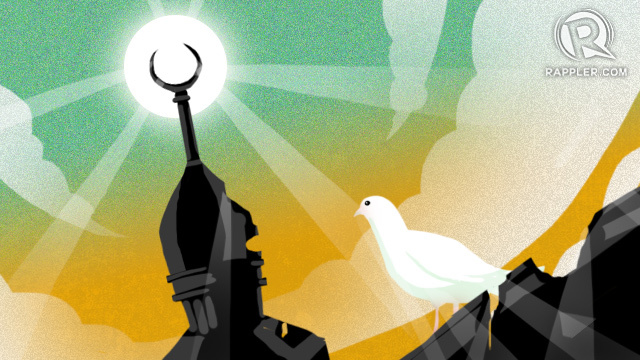Violence may have become the new normal but people are not letting it get in the way of their lives
Fear is terrorism's greatest asset. Its workmanship is the disruption of everyday life. Only through disruption can terrorism achieve its ultimate end, whether religious, political, or economic.
Not everyone can of course take up arms to fight back. And so there are those for whom fighting back takes on a different form.
Consider the Young Moro Professionals Network. Its members have released a public statement that not only denounces atrocities carried out in the name of Islam. They are convinced that the values of Islam are "justice, care for humanity, mercy and compassion, and religious tolerance."
To them these virtues run counter to the acts of violence against the people of Marawi. They are thus inspired by how "Muslims and non-Muslims [are] protecting and helping each other during this crisis."
Along similar lines, the Moro Islamic Liberation Front (MILF) has fully supported the fatwa of mufti Sheik Abehuraira Abdulrahman Udasan "against the entry and spread of violent radicalism or extremism." MILF, the government's partner in the Bangsamoro peace process, believes that religious violence "has no basis in any of the teachings of Islam."
Countering radicalization
The statements above matter if only to correct the radicalization that affects even many young people in Mindanao. Radicalization is the process in which violence against other people becomes a religiously justified act. There are many pathways to radicalization but religious ideas are quite powerful in shaping a person's cognitive and emotional commitment to violence. Training them for battle and socializing them into a violent worldview explains why the Maute Group has deliberately recruited children to become their soldiers.
These statements are, at the same time, important for everybody else. Public perception of Islam is divided as to whether it is responsible for the spread of religious violence. In fact, I have met a few otherwise nice people who harbor ill-informed views about Islam and its followers. To them all Muslims have the propensity to be violent because violence is inherent to Islam. They do not realize that Islam, which means submission, and salam, which means peace, are linguistically related to each other.
In a sense then, surrendering to the will of God brings about peace. This is why the violence many of us associate with Islam is in fact anomalous theologically and empirically.

Redemptive hope
Alongside these powerful statements are inspiring moments that render undeniable hope in the midst of crisis.
When I arrived at MSU-IIT last month, the first ones I met were sociology students from the Marawi campus of Mindanao State University. Many of the students in Marawi are Muslim. The ones I met were in the college dean's office to defend their undergraduate theses. This was, to them, their own way of fighting back and their professors, some of whom are my friends, were not going to let them down. They were all in Iligan to see them through it all.
Let me tell too the story of a DSWD [Department of Social Welfare and Development] coordinator in one of the evacuation centers in Iligan. A Maranao, she oversees its daily operations. She has admitted to me that she, herself, is among the internally displaced. Some relatives have taken her and two of her children in. But two others have been separated from her because there is simply not enough space. She is no longer sure about the condition of her house in Marawi. In spite of all these uncertainties, she has chosen to devote her time to help other evacuees. And she remains upbeat about the future.
Finally, we have Mubarak Macabanding Paingco. He is the first Muslim to graduate summa cum laude – and the only one at MSU-IIT. He is this year's valedictorian. During his valedictory address, he recounted his moving story about losing his mother at an early age. That he was holding back his tears made it difficult for him to finish his speech. He dedicated it to her and those who have been affected by the conflict in Marawi. Many of IIT's students and staff are Maranao.
There are certainly many other hopeful stories. But the parallelism is striking. Violence may have become the new normal but people are not letting it get in the way of their lives.
Fighting back
In the hostel where I am staying for the duration of my visiting professorship at MSU-IIT, I interacted with a young Maranao couple who evacuated from Marawi. They say in the strongest terms possible what I have also heard from other Maranao friends: Ipinahihiya ng Maute ang dangal naming lahat. (The Mautes are a disgrace to our dignity.)
But they are still full of hope about the future of their young family. This again shows how people are fighting back.
Hope in this light redeems not just the future but the present too.
In other words, foresight grounded in present reality can be empowering. It believes that people can fight back. The sociologist Les Back describes it in this manner: "Hope is not a destination; it is perhaps an improvisation with a future not yet realized."
Hope therefore is not just a fantasy. But it does not on its own spring eternal. To hope is a conscious effort among people of goodwill.
And because some people have already chosen goodwill, hope, we shall see, will stand the test of time.
The least that the rest of us could offer them, apart from our donations, is to believe in them.
http://www.rappler.com/thought-leaders/174908-marawi-conflict-hope-fights-back

No comments:
Post a Comment
Note: Only a member of this blog may post a comment.